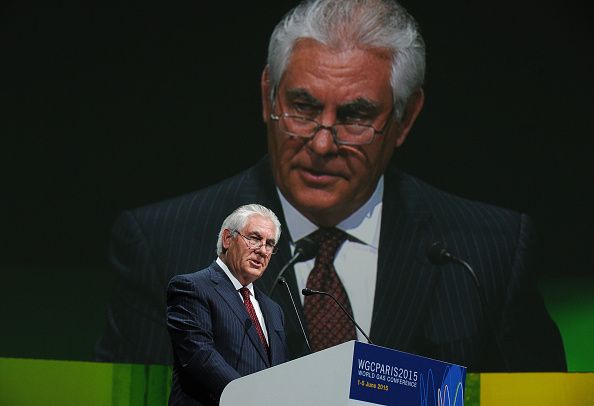
Under the leadership of former Secretary of State Rex Tillerson, oil giant Exxon Mobil signed a $120 million deal for an oil block in Liberia that company officials knew was rife with corruption, according to a new investigation by the transparency organization Global Witness.
The deal between Exxon and Liberian company Broadway Consolidated/Peppercoast (BCP) was signed in 2013 despite Exxon's concerns that the deal could violate U.S. anti-corruption laws. The investigation by Global Witness showed that Exxon executives were aware that the oil block they purchased was partly owned by former politicians who had taken ownership of the block through illegal means.
"Exxon knew its purchase might enrich these former politicians. The company also knew the oil block had originally been awarded to BCP after Liberia's oil agency paid bribes," the report said.
"Despite these corruption red flags, Exxon didn't walk away from the deal. Instead, it engineered a plan to skirt U.S. legal exposure, using the Calgary-based Canadian Overseas Petroleum as a go-between to purchase the block," the report continued.
The six Liberian officials who approved Exxon's purchase were also simultaneously awarded suspicious payments of over $200,000 each by Liberia's oil agency, according to the report. One of the officials was Robert Sirleaf, the son of Liberia's then-President Ellen Sirleaf.
"The payments were probably made from the same bank account into which Exxon had just deposited $5 million for Block 13, although there is no evidence that Exxon itself directed or knew about payments to officials," according to the report.
At the same time the deal was moving forward, company representatives, including Tillerson, lobbied the U.S. government to strike down a section of the Dodd-Frank Act that requires resource extraction companies like Exxon to disclose payments made to foreign governments for the commercial development of natural resources. Tillerson had reportedly argued to members of Congress that oil companies should not be required to disclose these payments.
The rule, known as Section 1504, has never come into force because Congress struck down its implementing rule around the same time Tillerson became secretary of state.
"The law requires companies report their project level payments to governments. It's been law since 2010, but it hasn't had an implementing rule," Stefanie Ostfeld, deputy head of Global Witness in the U.S., told Newsweek. "They overturned the rule in 2017, the same day Tillerson was sworn in as secretary of state.... So the law is still intact, but it doesn't have an implementing rule, so companies don't have to report."
We wrote a letter to the State Dept. earlier this week, calling on Secretary of State Rex Tillerson to formally recuse himself of any involvement in drafting new regulation to curb corruption in the extractives industry. #DoddFrank #Section1504https://t.co/lJxQr9IMaT pic.twitter.com/xhsyrbndRf
— EarthRights Intl. (@EarthRightsIntl) February 22, 2018
International development groups have argued that striking down Section 1504 would create an environment in which corruption could flourish. Meanwhile, anti-corruption group Transparency International has noted that corruption is a systemic problem in Liberia.
"Liberia has a protracted history of corruption and bad governance, which have consistently undermined sustainable development and effectiveness and efficiency in public service," Anderson Miamen, the organization's executive director for Liberia, said in a statement in January.
Exxon did not respond to requests for comment from Newsweek or Global Witness in time for publication. The Canadian company used as an intermediary told Global Witness that it was aware of the concerns about the oil block's minority shareholders but that the company's own due diligence did not reveal anything problematic about the deal.
Uncommon Knowledge
Newsweek is committed to challenging conventional wisdom and finding connections in the search for common ground.
Newsweek is committed to challenging conventional wisdom and finding connections in the search for common ground.
About the writer
Cristina Maza is an award-winning journalist who has reported from countries such as Cambodia, Kyrgyzstan, India, Lithuania, Serbia, and Turkey. ... Read more
To read how Newsweek uses AI as a newsroom tool, Click here.








